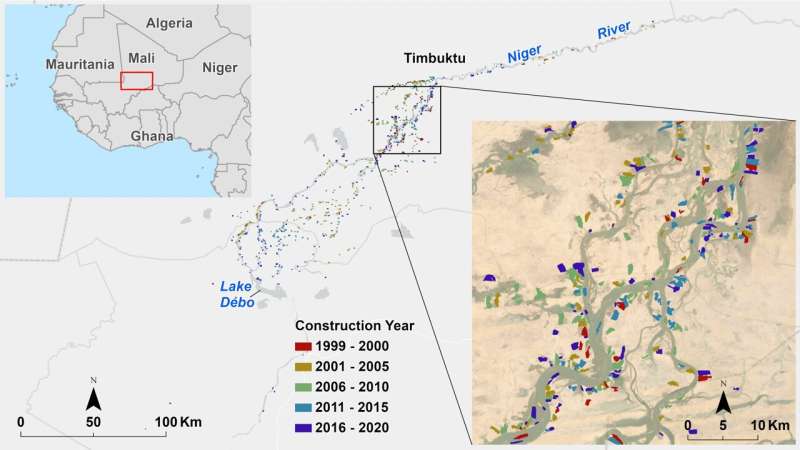This article has been reviewed according to Science X's editorial process and policies. Editors have highlighted the following attributes while ensuring the content's credibility:
fact-checked
peer-reviewed publication
proofread
Irrigation strengthens climate resilience in Mali

The installation of small-scale irrigation systems in communities in Mali led to lasting increases in agricultural productivity, decreases in local child malnutrition, and decreases in local conflict, providing resilience to climate change.
Between 1999 and 2020, German development agencies installed hundreds of small-scale irrigation systems to pump water from the Niger River onto crops. Development agencies also made improvements to seasonally flooded depressions near rivers known as mares.
Ariel BenYishay and colleagues gathered data using remote sensing, household surveys, and data from the Armed Conflict Location & Event Data Project. Using data from all three sources, the authors compared 1,000 locations before and after irrigation improvements. The findings are published in the journal PNAS Nexus.
Irrigation increased the greenness of local areas by an average of 32% even 15 years later, mostly during the rainy season. Using standard models, the authors estimate that this enhanced greenness represents an increase in rice yield of approximately half a ton per hectare—an estimate that matches farmer reports.
Most of the improvements were found around pump irrigation projects; improvements of the mares were less successful. Children living near pump irrigation projects were less likely to be stunted or wasted than children at pre-irrigation sites. Children who live 4–6km away, however, were found to be more nutritionally compromised than average.
Finally, there was less conflict close to irrigated areas than in non-irrigated areas, perhaps because rebels spare project sites. According to the authors, pump irrigation will help buffer the effects of climate change, which is predicted to raise the average temperature in Mali by 2.0 to 4.6°C by 2080.
More information: Ariel BenYishay et al, Irrigation strengthens climate resilience: Long-term evidence from Mali using satellites and surveys, PNAS Nexus (2024). DOI: 10.1093/pnasnexus/pgae022
Journal information: PNAS Nexus
Provided by PNAS Nexus




















